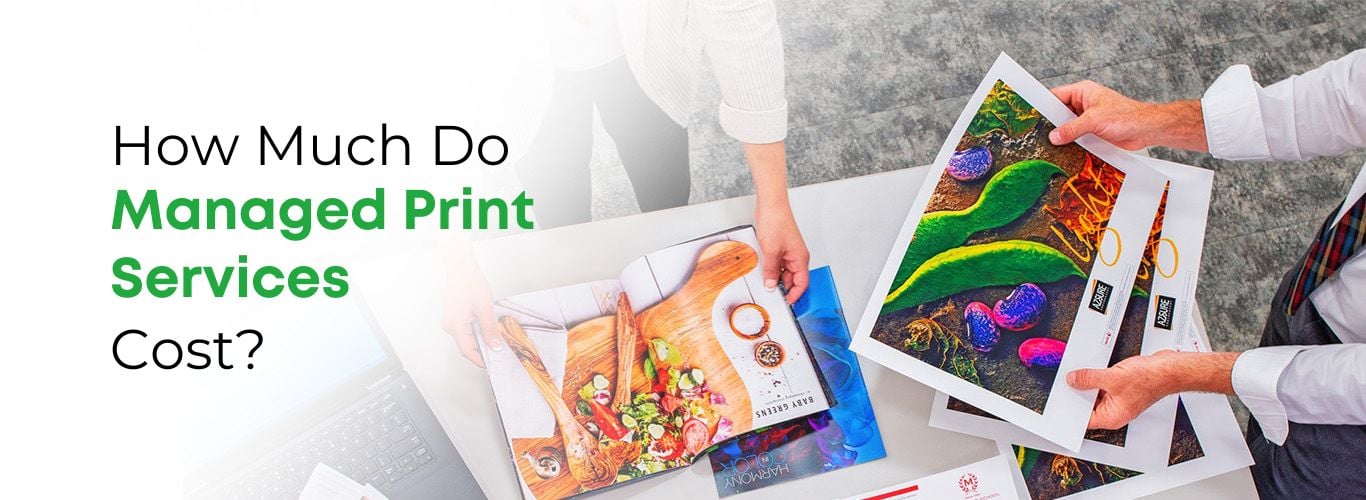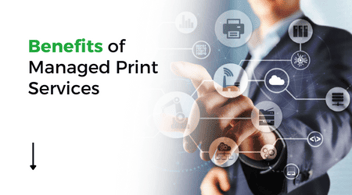How Much Do Managed Print Services Cost?

When juggling numerous operational responsibilities and services, having a reliable partner to lighten the load is invaluable.
At Print Partner, we work with hundreds of MSPs across the country, meeting their clients' demands with our managed print services.
Printing generates enormous value for all parties involved. Since price is often what determines if it’s worth managing printing in-house, it’s worth asking: how much do managed print services cost?
Ultimately, the cost of managed print services (MPS) comes down to three primary factors: the materials, the machine and the contract. And while the machine and materials may seem obvious, the contract’s included services ultimately determine what your customer pays.
What Do Managed Print Services Include?
- The specifics of what a managed print services provider includes in a contract and service level agreement (SLA) will be based on the client’s specific needs. However, many SLAs are based on similar structured pricing tiers for all customers.
Generally, your MPS partner will provide your customer: - A thorough print assessment to understand print requirements, print volume, pain points, current spend and any outsourced print costs. This will initially determine what types of machines would serve the business best. This will be conducted prior to the agreement and throughout the engagement to ensure services remain optimized on volume, support calls, and more.
- Hardware procurement or replacement (i.e., the printers and their components)
- Ongoing parts and maintenance service and technical support, specified in the SLA
However, contract stipulations outside the SLA can vary greatly and change the final costs.
Are Managed Print Services Worth the Cost?
Managing printers is very much a hassle—and it's not just the jams, WiFi issues, SMTP configuration and toner replacements that have caused everyone to lose their cool at least once. Printer-related issues can comprise up to 23% of the IT support calls your help desk receives.
Further, statistics related to printer costs show:
Better printing management helps organizations reduce print spend by 10% to 30%.
Collective printing costs can eat up 1-3% of a company’s annual revenue.
Regardless of the contract and service specifics, using an MPS is a great way to save your company money and cut down on headaches.
1. The Cost of Materials
Materials included with managed print services are priced per page according to the monthly volume.
Other factors that can affect the price include ink color, paper color, and paper size.
Regarding the printing materials’ effect on pricing, your customer’s needs and decisions will contribute to the final cost.
2. The Type of Machine
The type of machine(s) an MPS provider suggests, or their client selects for the service, will also affect the cost. Generally, larger machines will cost more but will have lower print-per-page rates. This is because larger machines have higher capacities for paper and toner (or ink), along with less frequent delivery of supplies.
The accessories that are selected for the print device also impact the overall cost. Things like paper folders and embosser attachments are going to drive up the total price.
Using Existing Machines
In some cases, your customers already have fully functional printers and simply want to partner with an MPS provider for materials to take continuous reordering and support off of their to-do lists.
Note that MPS providers’ ability to service and support existing devices will depend on their own machine offerings. Given the relationships with manufacturers, a quality MPS can likely source parts, service and automatically replenish the machines as easily as it could on its own.
But most would avoid any kind of guarantee about this arrangement without discussing it first.
3. The Contract’s Coverage
Printers and materials certainly affect MPS costs. But what your customer is paying for is the management of their printing services and removing the hassle it causes their business from handling it internally.
Your customer’s MPS contract and the services included affect monthly costs more than anything else. Questions to consider when accounting for this include:
Who manages printing for the business at present? Is that solution efficient?
How much of the printing management responsibilities are they looking to outsource?
If they intend to keep some print management responsibilities in-house, who is responsible?
Naturally, the more services included under the contract, the more internal bandwidth can be recovered, but the more your customer is likely to pay.
Print Contract Length
Just as you’d find in any service agreement, a guaranteed, long-term commitment to the partnership usually comes at a lower monthly rate.
Nearly all businesses prioritize extended relationships and the security they provide. Managed print services are no different.
If the managed print services contract your customer signs up for will last 36 months, that will cost more per month than a 60-month contract.
MPS contracts can be tricky to navigate. If you want to learn more, read: MSPs: How Your Clients Can Renegotiate MPS Contracts
Replenishment Toner
Will the MPS partner provide toner replenishments automatically, or will your customer have to submit page counts and order replenishment each time?
Tracking toner levels and automatically shipping refills will add costs to the services provided, but doing so removes another management item on your to-do list and ensures that your customer will always be stocked when they need to print.
Setup Considerations
If someone in your organization (or your client’s) can set up and configure the printer, you may be able to avoid the cost of on-site deployment services provided by the MPS vendor.
Otherwise, an MPS provider will add labor costs to send a technician out to deploy the machine. One of the great benefits here is that there are many configurable options on the device beyond IP, DNS, Subnet and SMTP info.
Having a veteran MPS project management team and installer collaborate with your MSP and your customer to deploy a device will ensure the device is securely and completely deployed.
Training Involvement
Following equipment setup, do employees need to be trained to use the machines? Some managed print service providers may add another charge to the setup bill for this service.
Any reputable print vendor will offer training with installation services at their customers’ request.
Many times, training is provided in a “Train the trainer” format, where the trainer works one-on-one with an employee in the company to get them up to speed on all the components and functions of the device. That person then trains the rest of the organization. If planned in advance with the MPS vendor, you (or your customer) can coordinate having their whole team available to participate in the training as well.
Support Considerations
The level of support specified in the service level agreement (SLA) will determine whether additional costs apply. Remote support for the printers’ software should always be straightforward and easy to manage. However, if there's a physical or mechanical issue, the support costs will be affected by how your MPS provider handles on-site calls.
Some MPS providers may send a technician out to assess the issue first, but this can add days or weeks to your downtime by involving parts procurement and a second visit to perform the necessary work.
Also, beware of any print vendor that doesn’t have a minimum monthly spend. When print vendors are willing to cater to very low monthly service costs, it is usually because they want to make a quick buck on the printer sale and offer bare-bone, low-quality MPS afterward.
To learn more about the expectations you should have in MPS support, read: What Support Should a Managed Print Services Vendor Provide?
4. Special Projects
If your customer needs to print a specialty project that a normal machine may not be able to handle, the managed print services provider might be able to accommodate it in-house.
However, this kind of project will likely appear as an additional cost on your next monthly invoice, since it falls outside your contract's terms. If special projects are a somewhat regular occurrence for your business, you’ll want to factor in or negotiate these rates ahead of time.
Trust Print Partner for All Your MPS Needs
At Print Partner, we take the hassle out of printing for managed service providers. Too many MSPs have dealt with print vendors who try to poach their clients with their own lackluster MSP services.
That’s the opposite of what Print Partner does.
We partner with MSPs to make printing easier for their clients and, in turn, make things easier for everyone. You introduce us to a prospective client and we handle the rest.
We're the trusted and preferred print vendor for hundreds of MSPs around the US because we bring value to you and your customers. Since we are not an MSP, there is no worry about us poaching the MSP services later on.
On top of that, we'll pay you! For each deal we close, we’ll pay the person who registers the opportunity at least $500 for the introduction and an additional $250 per $25K in revenue the deal brings us. For the MSP, we’ll pay $1,000 per 11x17 MFP sold, $100 per printer sold, and 5% recurring revenue on the client’s print allotment. And we’ll provide exceptional client service while we’re at it.
Partnerships should be collaborative, and with Print Partner, it is. So consider partnering with us, a Print Partner you can trust.
Sources:
Gartner. Managed Print Services (MPS).
Network World. The savings from print management is like picking low-hanging fruit.
Xerox. Managed Print Services for Mid-Sized Organizations.



